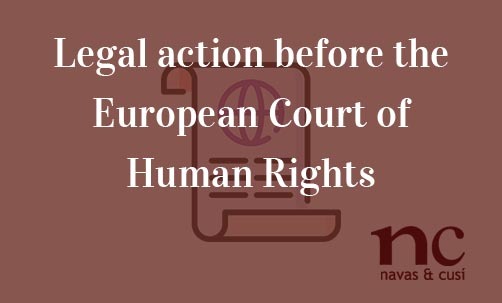
The European Court of Human Rights (ECHR)- also known as the Court of Strasbourg – is the Court responsible for ensuring proper compliance with the provisions of the European Convention for the Protection of Human Rights and Fundamental Freedoms and acting in cases where there has been any violation of the Convention by the Member States that have signed it.
Therefore, any natural or legal person who has suffered a violation of any provision of the Convention by a Member State has the capacity to submit a complaint before the European Court on the Human Rights, so that the Court can assess and examine if there had been any violated rights.
However, it should be pointed out that the Court’s admissibility requirements are very strict. So much so that the percentage of admissibility of an application is very low, since 95% of the applications that arrive are usually inadmissible.
What happens when a complaint is admitted? What are the next steps?
Firstly, it is important to note that the procedure before the European Court of Human Rights is in writing, so any communication between the Court and the plaintiff must be in writing. Due to the high volume of cases they have to study in the ECHR, communications between the plaintiff and the organ can be lengthy over a period that can even take months. Thus, the applicant cannot address the Court if the Court has not previously requested her to do so. Documents may only be sent to the Court if the Court so requests.
Before being admitted, the application is sent to one of the judicial formations of the ECHR, depending on the type of case in question. Thus, there are three “organs” which divide the matters according to the case and which are attributed the prior examination of a complaint to determine whether or not it is admitted: Judge, a Committee or a Chamber.
When the application has been admitted (it should be noted that when these are inadmissible the decision so established is not subject to appeal, i.e. the decision is final), it is transferred to the Member State alleged to be in breach of the Convention so that within a period of 16 weeks it can make representations regarding the Complaints made by the applicant and which have been previously admitted – since it may also be the case that the Court, in the examination of admissibility, agree that of the violations invoked in the application may be admitted only some Complaints and not all, so that the remaining Complaints will be declared inadmissible. When the Court receives the allegations, it transmits them to the plaintiff so that, in turn, she can make allegations in this regard if her right is appropriate.
The offending State is also given the option that the resolution of the case may go through an amicable agreement, for which a negotiation phase will be opened that will be parallel to the procedure initiated.
Once the pleadings phase is over, the Court may convene the parties for a hearing, although the Court may not consider it appropriate and may decide directly to deliver the Judgment.
In the Judgment, the Court may establish that there has been no breach of the Convention; on the contrary, if it considers that the acts carried out by the offending State are likely to breach the Convention, it may award damages as compensation to the plaintiff. It should be noted, however, that the judgments of the ECHR do not annul judicial decisions taken in the member state.
Depending on who issued the judgment, it is determined whether an appeal is possible or not. When the sentence is issued by a Committee, they are final and unappealable. While judgments handed down by a Chamber may be appealed to the Grand Chamber within a period of three months, once those three months have elapsed without an appeal having been filed, the judgement will be final. There can be no appeal against the judgments handed down by the Grand Chamber.
When the judgments are already final, they are sent together with their file to the Committee of Ministers of the Council of Europe so that they can ensure the correct execution of the judgement.
From Navas & Cusí, as lawyers specialized in European Union Law, we can advise you and defend your interests, even filing a lawsuit before the European Court of Human Rights.


